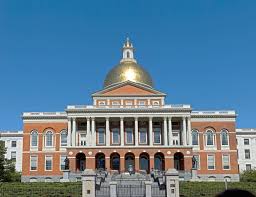| Fidelity and Amazon are planning to hire thousands of people? As area hotels endure ‘devastating’ times (WBUR) and other businesses scramble for survival, here comes Boston’s Fidelity Investments announcing that it’s … hiring 2,000 workers nationwide? The Globe’s Jon Chesto has the details on the mutual-fund giant’s plans to ramp up hiring to accommodate the demand for financial guidance for customers. Meanwhile, from the BBJ’s Lucia Muffei: “Amazon to add 1,800 Mass. jobs during pandemic.” They’re mostly going to be working at local fulfillment centers, it appears. Massachusetts joins multi-state coalition eyeing partial re-opening of economies Hours after downplaying talk of re-opening the economy amid the ongoing coronavirus outbreak, the Baker administration yesterday officially joined a new coalition of states that’s making preliminary plans to … partially re-open their economies. The Globe’s Matt Stout and SHNS’s Matt Murphy (pay wall) have more on the very, very preliminary talks. To stress: No one is talking about relaxing social-distancing restrictions at this point, especially with the state of Massachusetts yet to hit an anticipated peak in COVID-19 cases sometime in the next week or so. But they are talking about a future after the upcoming surge peak – a future that will likely loosen some, but certainly not all, restrictions. The NYT has more on the multi-state coalition that includes, in the Northeast, Connecticut, Delaware, New Jersey, New York and Rhode Island, in addition to the late-entry Massachusetts. |
| ‘Dire straits’: Harvard announces university-wide budget cuts Talk of partial re-opening of the economy aside: If this is happening at Harvard with its massive multibillion-dollar endowment fund, think what smaller colleges are facing. From the Harvard Crimson: “Facing dire economic straits brought on by the global COVID-19 pandemic, Harvard is instituting an immediate University-wide salary and hiring freeze, cancelling or deferring discretionary spending, and considering deferring all capital projects.” The administration also isn’t ruling out eventual layoffs and furloughs, the Crimson reports. |
| BU isn’t the only college thinking of keeping campuses closed this fall And speaking of higher education, the Globe’s Deirdre Fernandes and the Herald’s Erin Tiernan report that an increasing number of local universities – including UMass, MIT and Harvard – are now thinking the once unthinkable: Campuses may have to remain closed this coming fall due to the coronavirus outbreak. No final decisions have been reached yet. MassLive reported on BU’s deliberations the other day. Meanwhile, from Fred Thys at WBUR: “Students with college loans feel added pressure as the Economy tanks.” |
| Will the surge please make up its mind? Are we or are we not already in the midst of the coronavirus surge? The Herald’s Erin Tiernan reports that, yes, it’s here. And Tiernan reports separately that Mayor Walsh believes it’s here too, or at least “in motion.” And from Dialynn Dwyer at Boston.com: “‘The surge has officially started’: Boston Medical Center ER doctor shares update from COVID-19 front lines.” But not everyone agrees that a surge is a surge just because some numbers surged over the weekend. From Shira Schoenberg at CommonWealth: “Is Massachusetts seeing the COVID-19 surge? State gears up to make, distribute PPE.” It seems the surge is also being defined by a multi-day spike in hospital admissions, not just spikes in coronavirus cases, and the former has been holding steady. Then again, Universal Hub has a chart showing a very distinct surge in deaths in Massachusetts. |
| State retreats on nursing-home conversions amid pandemic From a three-reporter team at the Globe: “Bowing to concerns about moving old and frail residents, Baker administration officials Monday backpedaled on a controversial plan to empty select nursing homes across the state to treat COVID-19 patients discharged from hospitals. Instead, they said, they’ll add nearly 1,000 beds by temporarily reopening former nursing homes for COVID-19 recovery.” And now government officials can also focus more on existing dire conditions at occupied nursing homes, where the city of Cambridge recently discovered, as a result of new testing, that there’s far more infected patients than previously believed, as Cambridge Day’s Sue Reinert reports. Meanwhile, from WBUR: “Baker Says State Is Ramping Up Support For Hard-Hit Nursing Homes, Chelsea Residents.” … And from CommonWealth magazine: “Nursing home leader warns of death and devastation/Asks state for more testing, more PPE, and $130m more a month.” |
| Closing window: Polar Park won’t be ready if shutdown extends into June The wiggle room is all but gone. Worcester City Manager Edward Augustus Jr. tells Brad Kane of the Worcester Business Journal that if work remains halted on Polar Park into June, the WooSox will not be able to start the 2021 season on time as planned. |
| MBTA ridership plunges more than 90 percent Looks like we’re going to need more transit funds from the feds. The Herald’s Rick Sobey and SHNS’s Colin Young (pay wall) report that MBTA ridership has plummeted by 90 percent in recent weeks, punching a $231 million hole in the T’s fiscal 2020 budget. The numbers are just brutal. |
| Does changing candidate signature-gathering requirements really have to be so difficult? WGBH’s Adam Reilly takes a look at the debate over changing signature-gathering requirements for political candidates amid the current coronavirus outbreak in Massachusetts. Yesterday, a Senate bill that would lower the number of signatures required to get on the ballot hit a wall, after it drew objections from Sen. Ryan Fattman, as Reilly reports. Now the “prospect of the Massachusetts House and Senate agreeing on a fix may seem increasingly unlikely.” SHNS’s Matt Murphy and Sam Doran (pay wall) have more on the signature-gathering controversy on Beacon Hill. |
| As if coronavirus quarantines aren’t bad enough, tens of thousands without power this morning due to high-wind storm At one point yesterday, more than 100,000 customers lost their power as a result of the high-wind storm that swept through the region. As of this morning, the number of customers without power stood at just over 42,000, according to MEMA. WBUR reports utilities are attempting to restore power while their employees try to practice safe social-distancing procedures. Meanwhile, Gov. Charlie Baker said yesterday that hospitals appeared adequately prepared for power emergencies amid the coronavirus outbreak, WGBH reports. |
| Government updates: Spilka backs diversity task force, stronger safety-net measures urged, hospitals to get funds SHNS’s Katie Lannan (pay wall) reports that Senate President Karen Spilka, reacting to recommendations proposed by the Black and Latino Legislative Caucus, has agreed to establish “a diversity advisory task force” with the goal of keeping track of emerging racial health disparities amid the current coronavirus crisis. … Along the same lines, from SHNS’s Chris Lisinski: “Rep: People Hurting Before COVID-19 Suffering Disproportionately.” Meanwhile, in other government news, from MassLive: “Lawmakers, advocates press for more aid for children, disabled and older residents.” … From SHNS: “Remote Negotiations Underway on Housing Bill.” Lawmakers are hoping to finally have a housing bill sometime later this week. … From MassLive: “Coronavirus recovery bill sends $841M to Massachusetts hospitals, Rep. Richard Neal says.” |
| Bernie Rubin, founder of Bernie & Phyl’s, dies of coronavirus illness Another sad one. From WCVB: “Bernie Rubin, the founder of Bernie & Phyl’s chain of furniture stores, has died from coronavirus-related complications. Rubin was 82. Rubin started the furniture store with his wife Phyllis in 1983, expanding to nine stores in Massachusetts, Rhode Island and New Hampshire.” In Bernie’s honor, Universal Hub has posted one of the company’s so-bad-it’s-good TV commercials. Bernie Rubin, RIP. |
| Senate hopeful outlines economic recovery plan: Return of ‘Happy Hours’ GOP state Senate candidate Jay McMahon unveiled his own version of an economic recovery plan for the Bay State, including the return of happy hour to local bars and restaurants after a 36-year absence, rollbacks of sales and other taxes, a two-week unpaid furlough for all state workers and a 30-day pause on meals taxes once restaurants reopen, Geoff Spillane reports in the Cape Cod Times. |










